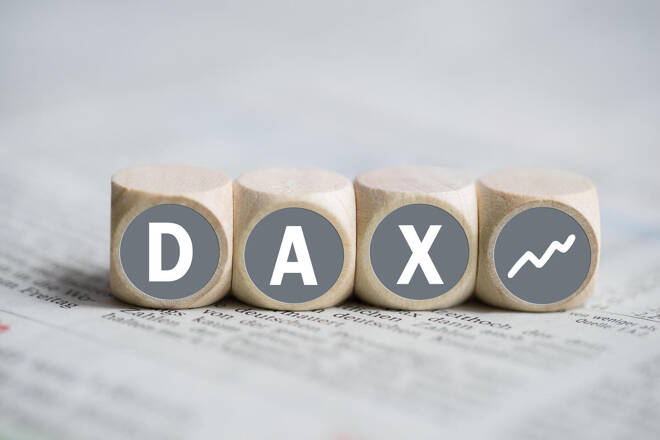Advertisement
Advertisement
DAX Rallies as Retail, Banks, Real Estate, and Tech Stocks Lead the Way
By:
Risk assets return to favor in Europe, driving up German's DAX Index across major sectors.
Key Takeaways
- European stocks climb to three-week highs
- Retail, banking, real estate, and tech stocks lead gains
- H&M shares rise 12.7%, UBS shares up 2.1%
- Spain’s inflation rate falls to 3.3%, government cuts VAT on food staples
Overview
European stock markets continued their positive trend from the previous three sessions on Thursday, as concerns about the banking sector eased.
Boosted by encouraging signs of lower inflation and positive results from retail giant H&M, European stocks rose to their highest level in three weeks.
The pan-European STOXX 600 index climbed by 0.8%, with all sectors showing gains.
As of 11:43 GMT, Germany’s DAX is up by 1.31%, trading at 15529.34, while the UK’s FTSE-100 rose by 0.94% to 7635.46 and France’s CAC 40 Index increased by 1.35% to 7283.68.
Retail, Banks, Real Estate, and Tech Stocks Rally as Risk Assets Return to Favor
Retail: H&M shares rose 12.7% after reporting a surprise first-quarter profit, although overall sales for the spring season were delayed by cold weather. As a result, the wider retail index (.SXRP) rallied 3.0%, with retail stocks leading the pack, up 3.7%.
Banks: Banking stocks climbed 1.8% to reach a one-week high, buoyed by the sale of failed Silicon Valley Bank’s assets and takeover of embattled Swiss lender Credit Suisse.
UBS shares rose 2.1%, with the bank’s announcement that Sergio Ermotti would return to his role as group CEO from April 5 following the acquisition of Credit Suisse boosting the stock. On Wednesday, UBS shares ended the session 3.7% higher.
Real Estate: Europe’s real estate sector jumped 3.2%, as concerns about the highly leveraged sector eased after a heavy drop in March dragged it close to 10-year lows hit last year.
Technology: Tech stocks were up 1.9%, with Danish wind turbine maker Vestas climbing 5.9% after winning an order in Brazil.
Health: Dutch health technology firm Phillips rose 7.5% after CEO Roy Jakobs told Dutch financial daily FD that the company expected to reach settlements this year relating to its global recall of respiratory devices. Risk assets returned to favor, contributing to the sector’s gains.
Spain’s Inflation Rate Falls to 3.3%
Spain’s annual inflation rate has decreased from 6% in February to 3.3% in March, which is lower than what analysts polled by Reuters had predicted. The slowdown in inflation is primarily due to lower electricity and fuel prices.
Additionally, the month-on-month inflation rate was 0.4%, and core inflation, which excludes food and energy, decreased from 7.6% to 7.5%.
The Spanish government has also taken steps to address rising food prices by cutting the value-added tax on food staples like bread, cheese, milk, fruit, and vegetables to 0% from 4%.
For a look at all of today’s economic events, check out our economic calendar.
About the Author
James Hyerczykauthor
James Hyerczyk is a U.S. based seasoned technical analyst and educator with over 40 years of experience in market analysis and trading, specializing in chart patterns and price movement. He is the author of two books on technical analysis and has a background in both futures and stock markets.
Advertisement
